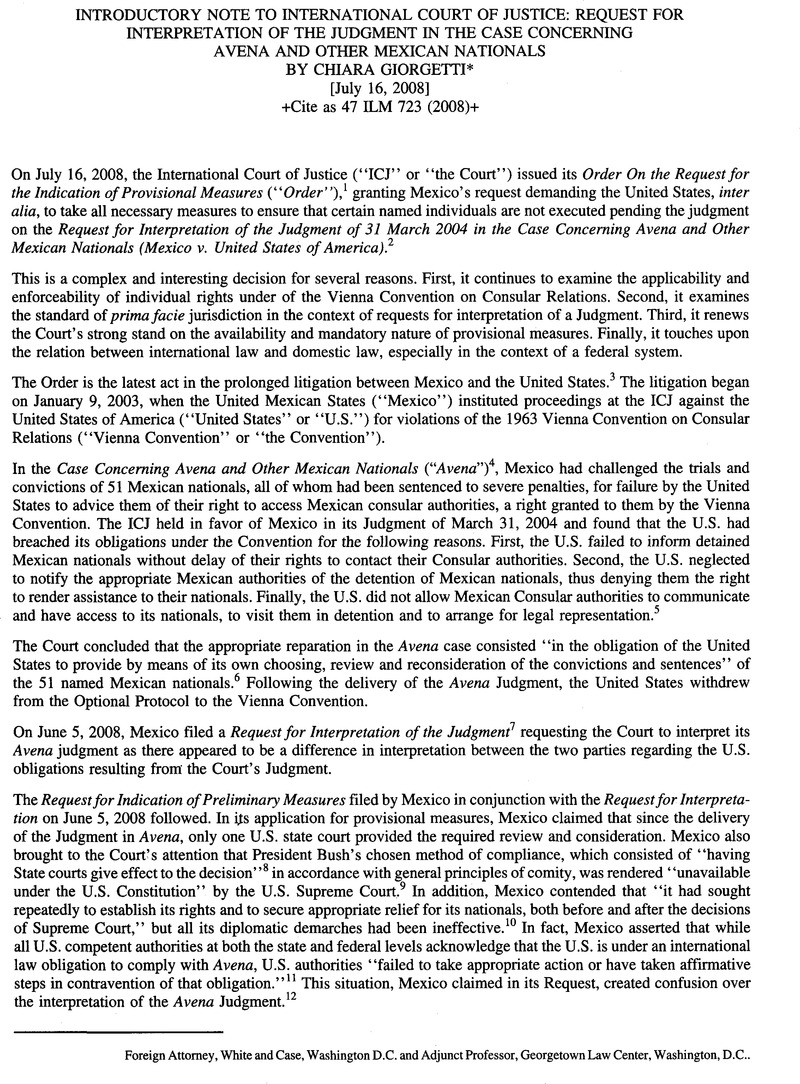Published online by Cambridge University Press: 27 February 2017

1 Request for Interpretation of the Judgment of 31 March 2004 in the Case Concerning Avena and Other Mexican Nationals (Mex. v. U. S.), 2008 ICJ 139 (Order of July 16) [hereinafter Order].
2 Avena and Other Mexican Nationals (Mex. v. U.S.), 2004 ICJ Rep. 12 (March. 31)[hereinafter Avena]. This part of the dispositif was decided by a seven to five majority.
3 In fact, prior to the case brought by Mexico in 2003, Paraguay and Germany had both brought cases to the ICJ complaining of the U.S.’ failure to provide consular notification under the Vienna Convention. The ICJ was requested, and had granted, provisional measures in both cases. See Application of the Government of Paraguay (Apr. 3, 1998), Vienna Convention on Consular Relations (Para v. U.S.), Provisional Measures, 1998 ICJ Rep. 11 (Apr. 9 1998); and Application Instituting Proceedings Submitted by the Federal Republic of German (Mar. 2 1999), LaGrand (Ger. v. U.S.) (ICJ June 27, 2001). Both decisions are available on the ICJ website (www.icjcij.org).
4 Order, supra note 1.
5 Id. ¶ 153.
6 Id. ¶ 153 (9).
7 See supra note 1.
8 The President's Memorandum for the Attorney General is available at http://www.whitehouse.gov/news/releases/2005/02/20050228-18.html.
9 See Medellin v. Texas, 128 S. Ct. 1346 (2008) (holding, in a 6-3 decision, that Avena was not binding federal law and was therefore, absent an implementing statute, not enforceable by federal courts against Texas, and thus did not preempt the state procedural bar to Medellin's habeas claim. The Court further held that a 2005 memorandum issued by President Bush, stating his intention to enforce Avena, did not create binding law that could be enforced against Texas).
10 Order, supra note 1, ¶ 7.
11 Id. ¶ 7.
12 Mexico maintained that it understands that ¶ 153 (9) created “an obligation of results” which is complied with only when review and consideration of the convictions and sentences are completed.
13 Order, supra note 1, ¶¶ 4-5.
14 Art. 41 of the Statute reads: “1. The Court shall have the power to indicate, if it considers that circumstances so require, any provisional measures which ought to be taken to preserve the respective rights of either party. 2. Pending the final decision, notice of the measures suggested shall forthwith be given to the parties and to the Security Council.“
15 Order, supra note 1, ¶ 32.
16 Art. 60 of the Statute states “The judgment is final and without appeal. In the event of dispute as to the meaning or scope of the judgment, the Court shall construe it upon the request of any party.“
17 Order, supra note 1, ¶ 42.
18 Id. ¶ 42.
19 Art. 73 of the Rules of the Court states “LA written request for the indication of provisional measures may be made by a party at any time during the course of the proceedings in the case in connection with which the request is made. 2. The request shall specify the reasons therefore, the possible consequences if it is not granted, and the measures requested. A certified copy shall forthwith be transmitted by the Registrar to the other party.'’ Under Art. 74 (1) of the Rules “ [a] request for the indication of provisional measures shall have priority over all other cases.“
20 Order, supra note 1, ¶¶ 53-54.
21 Id. ¶ 56.
22 Id. ¶¶ 65-66.
23 Id. ¶ 69.
24 Id. ¶ 20.
25 Id. ¶ 64.
26 Id. ¶¶ 73-74.
27 Id. ¶ 76.